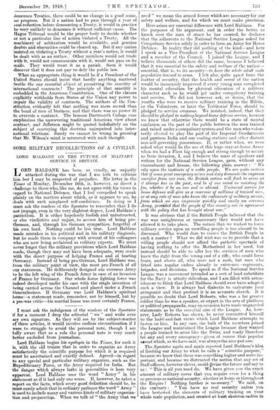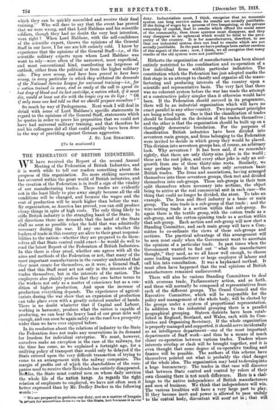SOME MILITARY RECOLLECTIONS OF A CIVILIAN.
attacked during the war that I am loth to criticize him lest I may be suspected of prejudice. His letter in the Times of Monday, December 16th, is, however, so direct a challenge to those who, like me, do not agree with his views in regard to National Defence, that I feel compelled to speak plainly on the matters about which, as it appears to me, he deals with such misplaced self-confidence. In doing so I must ask the readers of the Spectator to remember that I do not impugn, even in the very slightest degree, Lord Haldane's patriotism. It is either hopelessly foolish and uninstructed, or else vindictive and unjust, to accuse him of being pro- German, and, through his German sympathies, forgetful of his own land. Nothing could be less true. Lord Haldane made mistakes in his political and in his military diagnosis, but he made them in company with several of his colleagues who are now being acclaimed as military experts. We must never forget that the military provisions which Lord Haldane made, though they may not have been adequate, were made with the direct purpose of helping France and of beating Germany. Instead of being pro-German, Lord Haldane was, from the military point of view, the most pro-French of all our statesmen. He deliberately designed our overseas Army to be the left wing of the French Army in ease of an invasion of Prance by Germany. Our whole home fighting force was indeed developed under his care with the single intention of being carried across the Channel and placed under a French Generalissimo. If Germany was Lord Haldane's spiritual home—a statement made, remember, not by himself, but by a pre-war critic—his martial home was most certainly France.
I must ask the indulgence of the readers of the Spectator if for a moment I drop the editorial " we " and write over my own signature. As they will see by the subject-matter of these articles, it would involve endless circumlocution if I were to struggle to avoid the personal note, though I am fully aware that as a rule the personal note is very much better excluded from journalism.
Lord Haldane begins his apologia in the Times, for such it is, with the old truism that in order to organize an Army satisfactorily the scientific purpose for which it is required must be ascertained and exactly defined. Agreed—in regard to any special and particular military organism, such as the 111xpeditionary Force, or the Army required for India. But the danger which always lurks in generalities is here very apparent. Lord Haldane uses the word " Army " in his statement as if it had only one sense. If, however, he takes a report on the facts, which every good definition should be, he must surely admit that in ordinary parlance the word" Army" in used to include many and various kinds of military organisa- tion and preparation. When we talk of "the Army that we need" we mean the armed forces which are necessary for our safety and welfare, and for which we must make provision. Here arises my essential difference with Lord Haldane. For the purposes of his argument, and in order the better to knock over the man of straw he has created, he declares that the adherents to the National Service League asked for Compulsory Service solely in order to form an Army for Home Defence. In reality they did nothing of the kind—and here I speak as a Vice-President of the National Service League and a member of the Council. I joined- the League, and I believe thousands of others did the nine, because I believed that it was essential to the safety and welfare of the nation— essential, that is, to its security—to have the whole adult male population trained to arms. I felt also, quite apart from the matter of security, that the health and moral of the nation would be immensely improved if every young man completed his mental education by physical education of a military character such as he would get under compulsory training and service. We did not however ask, or desire, that the youths who were to receive military training in the Militia, or the Volunteers, or later the Territorial Force, should be pledged to service overseas. We insisted, indeed, that they should be pledged to nothing beyond home defence service, because we knew that otherwise there would be a state of mental confusion on the part of the public between the men trained and raised under a compulsory system and the men who volun- tarily elected to play the part of the Imperial Gendarmerie and garrison India and our coaling-stations and other distant non-self-governing possessions. If, or rather when, we were asked what would be the use of this huge stay-at-home Army when we had a Fleet big enough and strong enough to secure us from invasion, I, and I believe the mass of speakers and writers for the National Service League, gave, without any concealment and finesse, the following plain answer : We rely upon the instincts of a noble people. We are quite certain that if some great emergency arises and duty demands the supreme sacrifice from our race, the British nation will flock to arms as it always has in the past, and be of one mind in resisting the foe, whether it be on our soil or abroad. Universal service for home defence will give us a reservoir of millions of trained men, or at any rate of men who know the rudiments of military service, from which we can improvise quickly and easily an overseas Army, provided that the people of this country are in agreement with the policy that has brought about war."
It was obvious that if the British People believed that the war was unrighteous or unnecessary they would not have allowed it to take place. The notion that we wished to force military service upon an unwilling people is too absurd to be discussed. Who would dare to coerce the British People in such a matter ? What we did wish was so to provide that a willing people should not afford the pathetic spectacle of having nothing to offer the Motherland in her need, but instead should be able to offer her the services of men who knew the right from the wrong end of a rifle, who could form fours, and above all, who were not a mob, bat men who fitted into regular cadres already in existence—regiments, brigades, and divisions. To speak as if the National Service League was a movement intended as a sort of land substitute for the Navy is utterly ridiculous, and I am filled with aston- ishment to think that Lord Haldane should ever have adopted such a view. It is always bad dialectic to caricature your antagonist and then pretend it is an accurate sketch. It is possible no doubt that Lord Roberts, who was a far greater soldier than he was a speaker, or expert in the arts of platform or political propaganda, may on occasion have made unguarded statements as to the essential aim of the League. As, how- ever, Lady Roberts has shown, he never committed himself to the bard-and-fast views which Lord Haldane attempts to fasten on him. In any case, the bulk of the members joined the League and maintained the League because they wanted a people trained to arms like the Swiss, and ready therefore for any and every emergency—given of course that popular assent which, as we have said, was always the sine qua non.
The Spectator again and again rejected Lord Haldane's idea of limiting our Army to what he calls a "scientific purpose," because we knew that there was something higher and more im- portant, and because we distrusted the notion that any set of Staff officers, however clever, could ivine the future and say to us : "This is all you need do. We have given you the exact amount of military cover that you require even for a thing so precious as national security, whether at home or throughout the Empire I Nothing further is necessary." We said, On the contrary : "You have no real security unless you have bestowed the elements of military training on your whole male population, and created at least skeleton cadres in which they can be quickly assembled and receive their final training." Who will dare to say that the event has proved that we were wrong, and that Lord Haldane and his scientific soldiers, though they had no doubt the very best intention, wore right ? When Lord Haldane, with the sell-confidence of the scientific expert, throws the opinions of the General Staff in our faces, I for one am .left entirely cold. I know by experience that the opinions of the General Staff—i.e., of the scientific military experts upon whom Lord Haldane was wont to rely—were often of the narrowest, most superficial, and most conventional kind, manifesting no largeness of outlook, either from the political or from the higher military side. They were wrong, and have been proved to have been wrong, in every particular in which they withstood the demands of the National Service League for universal training—i.e., for a nation trained in arms, and so ready at the call to spend its last drop of blood and its last cartridge, a nation which, if it must die, would at least not die with the tragic cry on its lips : "Oh if only some one had told us that we should prepare ourselves 1 " So much by way of Prolegomena. Next week I will deal in detail with some of Lord Haldane's specific statements in regard to the opinions of the General Staff, statements which he quotes in order to prove his proposition that we could not have had universal military training, and that therefore he and his colleagues did all that could possibly have been done in the way of providing against German aggression.
J. Sr. Lou STRACHEY.
(To be continued.)



























 Previous page
Previous page